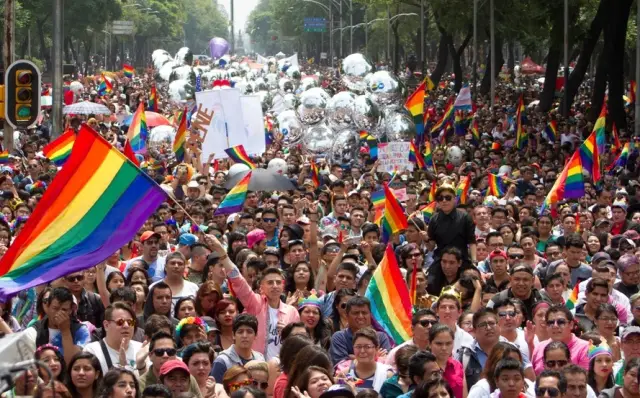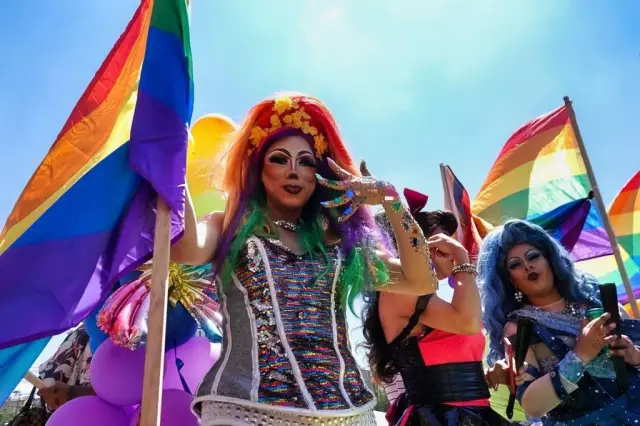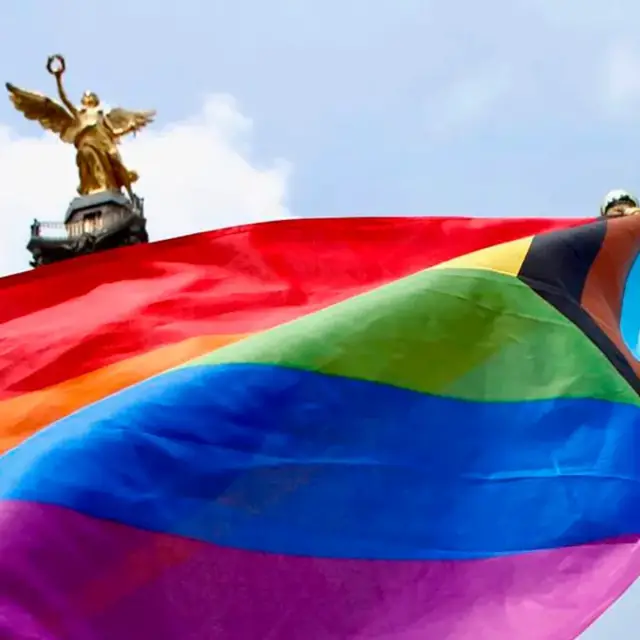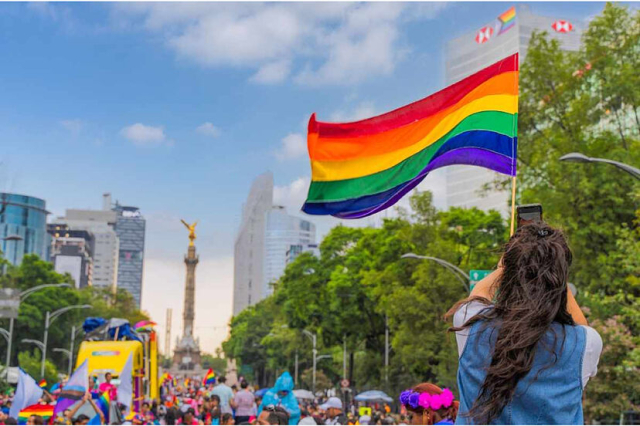LGBT Pride Day in Mexico is a key date for visibility, the fight for rights, and the celebration of sexual and gender diversity. It is commemorated every June 28th , in line with the rest of the world, in remembrance of the historic Stonewall Riots that occurred in New York in 1969, which marked the beginning of modern activism for LGBT+ rights.
In Mexico, this date has gained momentum in recent decades, becoming a massive demonstration of pride, resistance, and a demand for equality. The marches not only celebrate achievements, but also highlight the structural violence, persistent discrimination, and multiple forms of exclusion that lesbian, gay, bisexual, transgender, and other dissident people still face.

History of LGBT Pride Day in Mexico
First manifestations
The first Pride March in Mexico took place in 1979 in Mexico City. It was promoted by pioneering groups such as the Homosexual Revolutionary Action Front (FHAR), the Lambda Group, and other civil society organizations. At that time, marching was a deeply political and high-risk act, as police repression and social stigma were normalized in every setting.
Despite this, those who dared to take to the streets laid the foundations for a movement that is now a powerful, diverse, and present social force throughout the country. The first slogans demanded sexual freedom, visibility, and the right to live without fear.
Historical advances
Since those years, the country has seen important milestones that have transformed the legal and social reality of LGBT+ people:
2006: Mexico City recognizes same-sex civil unions, a first in the country.
2010: Same-sex marriage is approved in Mexico City, the first in Latin America.
2015-2022: Various states legislate in favor of same-sex marriage until national coverage is achieved.
Gender Identity Recognition: In at least 19 states, it is now possible to legally correct names and sex on official documents.
These legal advances have been accompanied by a growth in social awareness, the emergence of more LGBT communities, and greater representation in the media, although significant challenges remain regarding human rights, justice, and non-discrimination.

Pride Marches in Mexico: Colors, Culture, and Protest
Mexico City: The largest in the country
The Mexico City LGBT+ Pride March is the largest and most attended in the country. It brings together hundreds of thousands of people each year along Paseo de la Reforma, with allegorical floats, artists, activists, politicians, families, and people of all ages. This event combines celebration, protest, and hope for a more inclusive society.
It generally takes place on the Saturday closest to June 28th, departing from the Angel of Independence Square to the capital's Zócalo. It also includes concerts, artistic events, job fairs, and parallel activities throughout the city.
Other notable marches in the country
Although Mexico City leads the way in size, many Mexican cities have established their own marches and festivities:
Guadalajara: Considered one of the oldest in the country, it has a strong student and cultural presence.
Monterrey, Puebla, Querétaro, and Mérida: Each year they bring together thousands of people and have support from universities and NGOs.
Oaxaca, Chiapas and Guerrero: They stand out for including indigenous expressions and ancestral muxe or trans communities.
Even in rural or conservative areas, small groups have begun organizing visibility events, marking an unprecedented advance in the decentralization of the LGBT movement in Mexico.
Recognition and LGBT rights in Mexico
Legal achievements
Mexico has made significant legal progress in recent years, albeit with state-by-state disparities:
| Right | Current Situation |
|---|---|
| Equal Marriage | Legal in all 32 states |
| Homoparental adoption | Allowed in most |
| Legal gender identity | Recognized in 19 states |
| Classification of hate crimes | Partially recognized |
These reforms have been possible thanks to constant pressure from activists, strategic litigation, and rulings by the Supreme Court of Justice of the Nation (SCJN), which has played a crucial role as guarantor of rights.

Pending challenges
Despite the achievements, the LGBT+ community still faces significant obstacles in their daily lives:
High numbers of hate crimes , especially against trans people.
Labor and educational discrimination , which limits opportunities and generates structural violence.
Gaps in health services , including a lack of inclusive care for trans and HIV-positive people.
Lack of comprehensive anti-discrimination laws in some northern and southeastern states.
Importance of visibility and allies
Pride Day isn't just for the LGBT+ community; it's also an opportunity for family, friends, businesses, and allies to actively join the cause. The participation of non-LGBT people in marches and events highlights that human rights are universal and that we can all be agents of change.
Showing support also involves consuming ethically, hiring inclusively, educating younger generations with respect, and demanding concrete actions from authorities. Inclusion isn't just a rhetoric: it's a daily practice that everyone builds together.
Activities and celebrations within the framework of Pride
In addition to the marches, June marks Pride Month with multiple events across the country:
Cultural festivals featuring queer cinema, drag theater, contemporary art, and exhibitions.
Talks, panels, and forums organized by universities, groups, and embassies.
Job fairs that promote the labor inclusion of LGBT people.
Social media campaigns with hashtags such as #PrideMexico, #OrgulloLGBT, and #AmorEsAmor.
Participate with awareness and respect
If you decide to attend an LGBT+ pride march or event, it is important to do so in an informed, responsible, and respectful manner:
Wear sunscreen, bring water, and dress comfortably.
Respect the slogans, artistic and cultural expressions of the event.
Don't take photos without consent, especially of trans people, minors, or those participating in activism.
Shop locally and support LGBT businesses and artists attending the march.
One step beyond the rainbow 🌈
LGBT Pride Day in Mexico represents more than a celebration: it's a space for historical remembrance, political resistance, and collective love. It's a reminder of the progress made and how much remains to be achieved. Participating in this day also means committing to building a more just, equitable, and inclusive country, where human dignity prevails over any prejudice.
Every step in a Pride march is a step toward the freedom to be yourself without fear. Celebrate, support, and defend. Because LGBT rights are human rights, and their recognition is a task for all of society.
